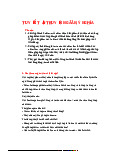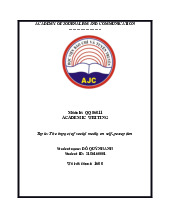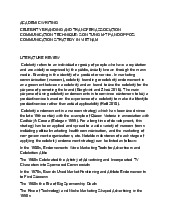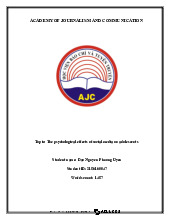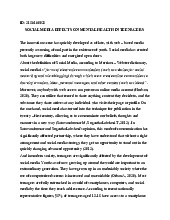



















Preview text:
lOMoAR cPSD| 46560390
Academy of Journalism and Communication Faculty of Foreign Languages
---------------------------------------------------------------------------------------------
--------------------------------------------------------------------------- Contents PART I: LETTER WRITING
....................................................................................... 1
UNIT 1.1: PERSONAL LETTERS ........................................................................ 1
1.Parts of personal letters .................................................................................. 1
2.Expressions of informal style ......................................................................... 2
3.Types of personal letters ................................................................................ 4
Asking for/giving advice ................................................................... 5
Letters of invitation ........................................................................... 6
Thank-you notes ................................................................................ 8
Letters of Apology/ Regret .............................................................. 10
Letters of condolence ...................................................................... 11
UNIT 1.2: BUSINESS CORRESPONDENCE .................................................... 15
1.Essential parts of a business letter ............................................................... 15
2.Punctuation styles ........................................................................................ 18
3.Business letter formats ................................................................................ 19
4.Types of business letters ............................................................................. 22
Letters of inquiry and request .......................................................... 22
Order letters ..................................................................................... 24
Letters of complaint ......................................................................... 25
Letters of apology ............................................................................ 27
UNIT 1.3: APPLICATION LETTERS ............................................................... 31
1.What is an application letter? ....................................................................... 31
2.Application letter format .............................................................................. 31
Writing 3 --Letter and News Writing Page lOMoAR cPSD| 46560390
Academy of Journalism and Communication Faculty of Foreign Languages
---------------------------------------------------------------------------------------
---------------------------------------------------------------------------------
3.Tips for writing application letters ............................................................... 35
UNIT 1.4: RÉSUMÉS ............................................................................................ 38
1.What is a résumé? ........................................................................................ 38
2.Résumé formmats ........................................................................................ 38
3.Referees ........................................................................................................ 42
4.Résumé building tips .................................................................................... 45
5.Language for résumés .................................................................................. 45 1
PART II: NEWS WRITING ...................................................................................... 48
UNIT 2.1: NEWS & NEWS VALUES ................................................................. 48
1. What is news?............................................................................................ 48
2. Difference between news and information ............................................... 48
3. Types of news............................................................................................ 49
4. News values............................................................................................... 50
UNIT 2.2: JOURNALISTIC ETHICS ................................................................ 55
1. Objectivity .................................................................................................. 55
2. Balance ...................................................................................................... 56
3. Accuracy .................................................................................................... 57
Unit 2.3: NEWS WRITING TECHNIQUES ....................................................... 62
1. Ideal length ................................................................................................. 62
2. Impersonal reporter .................................................................................... 64
3. Vocabulary and grammartical styles .......................................................... 65
4. Abbriviations .............................................................................................. 66
5. Numnbers ................................................................................................... 67
UNIT 2.4: STRUTURE OF NEWS & INVERTED PYRAMID FORMAT ..... 72
Writing 3 --Letter and News Writing Page lOMoAR cPSD| 46560390
Academy of Journalism and Communication Faculty of Foreign Languages
---------------------------------------------------------------------------------------------
---------------------------------------------------------------------------
1. Parts of a news report ................................................................................ 72
2.The inverted pyramid ................................................................................. 73
UNIT 2.5: WRITING HEADLINE & LEAD ................................................. 77
1. Headline .................................................................................................... 77
2. Lead ........................................................................................................... 79
UNIT 2.6: NEWS GATHERING AND VISUALS .............................................. 88
1.Gathering news ............................................................................................ 88
2.The importance of visuals ........................................................................... 92
UNIT 2.7: QUOTATIONS AND ATTRIBUTION ............................................. 97
1. Quotations .................................................................................................. 97
2. Attribution ................................................................................................ 100
REFERENCES ....................................................................................................... 104 2
Writing 3 --Letter and News Writing Page lOMoAR cPSD| 46560390
Academy of Journalism and Communication Faculty of Foreign Languages
-----------------------------------------------------------------------------------------
-------------------------------------------------------------------------------
PART I: LETTER WRITING UNIT 1.1: PERSONAL LETTERS
A personal letter is written to someone you know or want to know better. A personal
letter is usually written in casual, friendly language, or in practical straightforward
language, depending on the purpose and audience of the letter.
1. PARTS OF PERSONAL LETTERS
All letters must follow certain conventions or formats. Here is the format to use
when writing a personal letter. It will help you organize your letter and make it easier
for your friend to read. The personal letter format has five parts. Heading/Date Salutation,
…………………………………………Introduction………………………………………………
……………………………………………………………………………………………………………
…………………………..Body………………………………………………………………………
…………………………………………………………………………………………………………… Complimentary closing, Footer Signature
a. The heading in the upper right corner may consist of an address and date.
We do not use punctuation at the end of the heading lines.
b. Salutation: a greeting, “Dear Mary, Hi Mo, Hey cuz, Beloved Mum, Dearest Susie,”
Placed at the left-hand margin is rather friendly and informal. We do use comma here.
c. Introduction: opening comments, including asking about the person to whom you
are writing (his job, family, etc) and why you are writing;
d. The body may consist of one or more paragraphs, dealing with personal topics.
Writing 3 --Letter and News Writing Page 1 lOMoAR cPSD| 46560390
Academy of Journalism and Communication Faculty of Foreign Languages
-------------------------------------------------------------------------------------------------
-----------------------------------------------------------------------
e. The complimentary close is a closing comment. Write soon!
f. The footer: your closing remark, followed with a comma. Love, Jane sincerely yours, Tom Yours, Alan
g. Signature is written below the complimentary close.
h. Post Script is an extra bit of information or note that you want to include.
(Ashley, 1990; Breen, 2002) Sample:
2. EXPRESSIONS OF INFORMAL STYLE
• The greeting: Friendly letters begin with Dear + first name
Dear Alex, Dear Dad, Hi Mo, Hey cuz, Beloved Mum, Dearest Susie,
• Informal language and style (idioms, colloquial English)
• Abbreviated forms, pronouns omitted
Writing 3 --Letter and News Writing Page 2 lOMoAR cPSD| 46560390
Academy of Journalism and Communication Faculty of Foreign Languages
-----------------------------------------------------------------------------------------
-------------------------------------------------------------------------------
• The ending: Love/Yours/Best wishes + first name Yours/Love/Best wishes/Regards, Anthony
Task 1: Look at the diagram below which show lots of different expressions which
you can use in informal letters. Match the different items (0 – 9) with the
different sets of expressions (a – j).
Writing 3 --Letter and News Writing Page 3 lOMoAR cPSD| 46560390
Academy of Journalism and Communication Faculty of Foreign Languages
-------------------------------------------------------------------------------------------------
-----------------------------------------------------------------------
0. an informal salutations (‘hello!’) …………….. 1. asking how your friend is ……………..
2. a reference to past contact (the last time you wrote, spoke) ……………..
3. a statement of the reason for writing ……………..
4. the reason for writing : giving advice ……………..
5. the reason for writing: asking for advice ……………..
6. the reason for writing: expressing your feelings ……………..
7. talking about future contact (the next time you write, speak) …………….. 8. a final, closing remark ……………..
9. an informal footer (‘goodbye!’) ……………..
Task 2: Now try to find the correct phrases in this informal letter. Remember, this is for your friend. Dear James,
How are you?/I trust this letter finds you well. I’ve been dead
busy/extremely busy since your last letter. We have to work really hard
at school to get ready/in preparation for our SATs. Despite this, I did
manage to play/partake of a game of football last night with my
friends/acquaintances. We won/were victorious! It was boss/outstanding!
Also, my dad got me/purchased for me a new mobile
telecommunication device/mobile phone. It’s an 8210!
Anyway, gotta go/go to cease writing! Speak to you soon. Please write
back/please respond swiftly. Love from My Name. (Ashley, 1990; Breen, 2002)
Writing 3 --Letter and News Writing Page 4 lOMoAR cPSD| 46560390
Academy of Journalism and Communication Faculty of Foreign Languages
-----------------------------------------------------------------------------------------
------------------------------------------------------------------------------- 3. TYPES OF PERSONAL LETTERS
Any time you write a letter for a personal reason, you may use a personal letter format.
ASKING FOR/GIVING ADVICE
Letters asking for or giving advice can be formal, informal or semi-formal depending
on the situation. A letter asking for advice can be sent to a friend, a consultant or an
advice column in a magazine. Details of the problem should be mentioned. A letter
giving advice should contain suggestions introduced with appropriate language. Useful Language Informal Formal
Writing 3 --Letter and News Writing Page 5 lOMoAR cPSD| 46560390
Academy of Journalism and Communication Faculty of Foreign Languages
-------------------------------------------------------------------------------------------------
----------------------------------------------------------------------- Asking for Advice Asking for Advice Opening Remarks: Opening Remarks: - -
I'm writing to ask for your advice
I am writing to ask if you could help - me with
Can you give me your advice - -
I've got a problem and I need your
I would appreciate it if you could advice
give me some advice about -
I am writing to ask for your advice
- I would be grateful if you could offer your advice
- Could you possibly offer your advice
- I wonder if you could help me with a problem Closing Remaks: Closing Remaks:
- I would appreciate it if you could
- What do you think I should do?
give me your advice as soon as
- Please let me know what you think possible I should do -
I look forward to receiving your - advice
Please tell me what to do -
It would be of great help if you could Giving Advice advise me Opening Remarks: - Giving Advice
I just got your letters and I think I can help you Opening Remarks:
- I was sorry to hear about your
- Thank you for your letter requesting
problem. Here's what I think you
- I am writing in reply to your letter should do
asking for advice about
- I hope the following advice will be of some help to you
Writing 3 --Letter and News Writing Page 6 lOMoAR cPSD| 46560390
Academy of Journalism and Communication Faculty of Foreign Languages
-----------------------------------------------------------------------------------------
------------------------------------------------------------------------------- Suggestions Suggestions
- Why don't you
- I strongly recommend that
- It would be a good idea to
- I would suggest that
- What you should do is
- I believe the best course of action is
- How about.../I think you should
- I would advise you to
- The best advice I can give you is - You should/You ought to/If I were you I would Closing Remaks: Closing Remaks:
- I trust you will accept this advice
- Hope this has helped
- I hope this will be of help
- Let me know what happens - -
I would very much like to know if this
Let me know if you need any more was helpful help
(Ashley,199; Sandle & Keefe, 2004)
LETTERS OF INVITATION
Letters of invitation can be formal or informal depending on the situation and who
we are writing to. When writing letters of invitation, you need to take special care to
think about your purpose in writing. For example, are you writing simply to invite
them? Do they need to be persuaded to come? Do you need to know for sure that they
are coming so you can make sure there will be enough food? Will they need a place
to sleep? Depending on the situation, they (your audience) may need very precise
information: exact location, exact time, appropriate dress, and/or directions to the
place, approximate costs, and even sometimes whether it is necessary to reply to the
invitation (Sandler & Keefe, 2004).
Writing 3 --Letter and News Writing Page 7 lOMoAR cPSD| 46560390
Academy of Journalism and Communication Faculty of Foreign Languages
-------------------------------------------------------------------------------------------------
-----------------------------------------------------------------------
* RSVP is a process for a response from the invited person or people. It is an
initialism derived from the French phrase Répondez s'il vous plaît meaning "Please respond" Useful Language Informal Formal
Writing 3 --Letter and News Writing Page 8 lOMoAR cPSD| 46560390
Academy of Journalism and Communication Faculty of Foreign Languages
-----------------------------------------------------------------------------------------
------------------------------------------------------------------------------- Opening Remarks: Opening Remarks:
- I'm writing to invite you to...
- We would be honoured if you...
- I'd love it if you could come to... - I cordially invite you to...
- We're organising a ... and would
- Your presence would be
love it if you could come Closing appreciated at... - Remarks:
You are invited to attend...
- I hope you'll be able to make it... Closing Remarks:
- Hope you can come
- We would be grateful if you
- Looking forward to seeing you could... then
- Please indicate whether you will
- Please let me know as soon as be able to attend possible Expressions for directions :
- In case you don't know the way... Expressions for directions :
- I'll give you some directions... - I have included some directions...
- I have included some directions...
- Here are a few directions so you
Accepting an Invitation don't get lost Opening Remarks: -
- I am writing to thank you for the
In case you do not know the exact kind invitation of the...
- Thank you for the kind invitation which
Writing 3 --Letter and News Writing Page 9 lOMoAR cPSD| 46560390
Academy of Journalism and Communication Faculty of Foreign Languages
-------------------------------------------------------------------------------------------------
-----------------------------------------------------------------------
Accepting an Invitation
I would be honoured to accept Opening Remark Closing Remarks:
- Thanks for the invitation to ...,
- I look forward to seeing you... sounds lovely... - We wait the event Closing Remarks
with great anticipation - See you then Refusing an Invitation
- We're really looking forward to it Opening Remarks:
- We thank you for your recent Refusing an Invitation
invitation to ... but... Opening Remarks: Closing Remarks:
- Thank for the invitation, but...
- I am sorry to miss the opportunity - of...
Thanks for inviting me to ..., but -
I'm afraid I can't come Closing
Thank you again for the invitation... Remarks:
- I hope we will have the
- I hope we can get together some opportunity to meet other time
- I'm really sorry we'll have to miss it (Sandler & Keefe, 2004) THANK-YOU NOTES
Thank-you notes, another type of personal letter, are sent as a courtesy to thank
someone for his or her thoughtfulness or kindness. After receiving a gift, flowers, or
a favour, sending a thank-you note lets the sender know you received the gift, noticed
the favour, or appreciated his/her kindness. The thank-you note should be sent as
Writing 3 --Letter and News Writing Page 10 lOMoAR cPSD| 46560390
Academy of Journalism and Communication Faculty of Foreign Languages
-----------------------------------------------------------------------------------------
-------------------------------------------------------------------------------
soon as possible after receiving the gift or favour. Thank-you notes follow the same
format as friendly letters and in general should be handwritten. Depending on who
will receive the letter, you may use decorative note paper (Ashley, 1990; Sandle &
Keefe, 2004). A sample thank-you note follows: Useful Language •
Thank you for……………… •
I want to thank you for …………….. •
Many thanks for ……………. •
Thank you ever so much for …………….. •
I cannot thank you enough for the wonderful gift. •
We will remember this day and your contribution forever. •
You were invaluable today, thank you for all your help. •
Words cannot describe how grateful we are. •
It was a pleasure to be a part of your special day. •
I’m very happy to be a part of your celebrations. •
We are grateful for your kindness, loyalty and commitment to all of us. •
I am eternally grateful for your trust, and appreciate you allowing me to have this time off work. •
I am very thankful that you are considering my problem. •
We would like to express our gratitude.
Writing 3 --Letter and News Writing Page 11 lOMoAR cPSD| 46560390
Academy of Journalism and Communication Faculty of Foreign Languages
-------------------------------------------------------------------------------------------------
----------------------------------------------------------------------- •
If there ever was a boss who deserves praise and adulation, that person is you! •
I would like to sincerely thank you for this gesture. •
Allow me to express my sincerest gratitude for this opportunity you have given me. •
I value the trust you have put into me and will work hard to maintain it. •
I would like to express my heartfelt thanks for giving me this opportunity •
Thank you once again for everything you’ve done. •
How kind you are to help me. Thank you very much. •
I was so pleased to hear from you. •
I greatly appreciate your kind words. •
We appreciate you sharing our celebrations with us.
(My English Teacher, 2016)
LETTERS OF APOLOGY/ REGRET
- If you are unable to attend a function, particularly one for which you have
received a written invitation, a letter of regret / apology is not only polite,
but usually expected. The letter you write should be warm and friendly. In
many cases, you may want to explain why you are not able to attend. Be
sure to thank the person for the invitation and let them know you appreciated it.
- A letter of apology can be either formal or informal. It can be written when
someone has made a mistake, has failed to perform a duty or is not able to
fulfill a promise (Geffner, 2007; Sandle & Keefe, 2004).
Writing 3 --Letter and News Writing Page 12 lOMoAR cPSD| 46560390
Academy of Journalism and Communication Faculty of Foreign Languages
-----------------------------------------------------------------------------------------
------------------------------------------------------------------------------- April 30, 2003 Dear Sylvia,
Thank you so much for thinking of us and inviting us to be part of Mark
and Emma’s special day. Unfortunately, we will not be able to come
because our daughter, Moira, is graduating from Mount Allison
University in Sackville that weekend.
You can’t believe how disappointed we are that we will miss the fun
with all our old friends. We do, however, want to be part of the
donation you mentioned, so I have enclosed a cheque for you to add to the pot.
Thanks again for including us. Please tell Mark and Emma that we will
definitely make time to visit them later in the summer. Love, Anna and Frank
Useful Language Opening Remarks:
- I hope you will understand when I say that...
- What can I say, except I'm sorry that... - I'm sorry for...
- I owe you an apology...
- I'm so sorry if I upset you in any way...
- I can't describe how sorry I am and how guilty I feel... Closing Remarks:
Writing 3 --Letter and News Writing Page 13 lOMoAR cPSD| 46560390
Academy of Journalism and Communication Faculty of Foreign Languages
-------------------------------------------------------------------------------------------------
-----------------------------------------------------------------------
- I hope you believe me when I say how sorry I am...
- I can't tell you how sorry I am...
- I beg you to forgive me for...
- There is no excuse for ... and I hope you'll forgive me...
(Geffner, 2007; Sandle & Keefe, 2004)
LETTERS OF CONDOLENCE
A letter of condolence is sent to express sympathy for something that has happened
to the reader of the letter or to someone close to him/her. This is probably the most
difficult of all personal letters to write. You will want to console the reader without
increasing his/her sorrow. When writing letters of condolence, start by telling why
you are writing the letter. Then, tell how you feel about the situation. Express your
sympathy. Keep the letter as simple as possible. Useful Language
- I am so sorry to hear the news about your mother. Please know that you are in my thoughts and prayers.
- My deepest condolences to you. Words cannot express the how sorry I am to hear
about (mother’s name). I will keep you in my prayers.
- My heart is filled with sadness for your loss. Please accept my deepest condolences
and know that my thoughts are with you during this time.
- May your memories of (mother’s name) sustain and strengthen you as you navigate
the difficult days ahead. Please accept our condolences.
Writing 3 --Letter and News Writing Page 14 lOMoAR cPSD| 46560390
Academy of Journalism and Communication Faculty of Foreign Languages
-----------------------------------------------------------------------------------------
-------------------------------------------------------------------------------
- You have my deepest sympathies. My prayers are with you during this time.
- May your hearts soon be filled with wonderful memories of joyful times together as
you celebrate a life well lived.
- We closed our sample letter with:
The closing statement is perhaps one of the most important parts of any condolence
letter. It is the final opportunity within the letter to offer your sympathies. Other
phrases that can be appropriate to use in a words of condolence letter for a mother include the following:
- With prayers for strength to face these challenging days.
- With hope it helps you to know we are thinking of you.
- With warm and heartfelt sympathy.
- With all of our blessings, love and prayers.
- Please know you are not alone.
- With our deepest and heartfelt condolences. (Sandle & Keefe, 2004) PRACTICAL EXERCISES
Exercise 1: Here are some common phrases that you might find in an informal
letter. Match the phrase in the column on the left to the appropriate
usage in the column on the right. 0. That reminds me… ______ a. to finish a letter 1. Why don’t we… ______ b. to apologize 2. I’d better get going…
______ c. to thank the person for writing 3. Thanks for your letter… ______ d. to begin the letter 4. Please let me know…
______ e. to change the subject 5. I’m really sorry… ______ f. to ask a favor 6. Love,
______ g. before signing the letter 7.
Could you do something for me? ______ h. to suggest or invite 8. Write soon… ______ i. to ask for a reply 9. Did you know that…
______ j. to ask for a response 10.
I’m happy to hear that… 11. I
______ k. to share some information
wouldn’t be surprised if… 12. Long time ______ l. to introduce a good thing no see!
______ m. to introduce a potential outcome ______ n. a greeting
Writing 3 --Letter and News Writing Page 15 lOMoAR cPSD| 46560390
Academy of Journalism and Communication Faculty of Foreign Languages
-------------------------------------------------------------------------------------------------
-----------------------------------------------------------------------
Exercise 2: Using a suitable word or expression to complete the gaps in the letter
(1 – 8). There is an example at the beginning (0).
Writing 3 --Letter and News Writing Page 16
